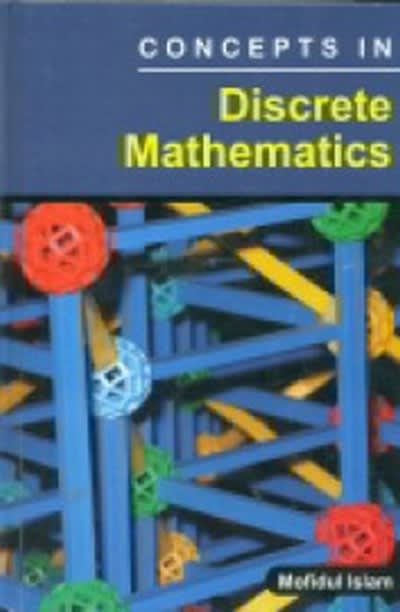Question
Think about the accompanying denitions for sets of characters: Digits = {0, 1, 2, 3, 4, 5, 6, 7, 8, 9} Letters = {a, b,
Think about the accompanying denitions for sets of characters:
Digits = {0, 1, 2, 3, 4, 5, 6, 7, 8, 9}
Letters = {a, b, c, d, e, f, g, h, I, j, k, l, m, n, o, p, q, r, s, t, u, v, w, x, y, z}
Special characters = {, and, $, #}
Process the quantity of passwords that fulfill the given imperatives.
(I) Strings of length 7. Characters can be extraordinary characters, digits, or letters, with no rehashed characters.
(ii) Strings of length 6. Characters can be extraordinary characters, digits, or letters, with no rehashed characters. The rst character can not be an uncommon character.
Question 2 .With concrete a model recognize the accompanying terms as applied in likelihood hypothesis:
Binomial dissemination and poisson conveyance
Discrete irregular variable and ceaseless arbitrary variable
Ordinary dissemination and standard typical conveyance
Discrete likelihood conveyance and ceaseless likelihood dispersion
Question 1. What are the significant properties fundamental the likelihood work for a discrete arbitrary factors?
An arbitrary variable has a likelihood thickness work .f(x)=cx(6-x)2 0<=x<=6 and 0 in any case
. Compute the number juggling mean, fluctuation and standard deviation of X r.v
2. In the throwing of three reasonable coins, let the arbitrary variable X be characterized as X = number of tails. At that point X can expect values 0, 1, 2, and 3.
What is the likelihood appropriation for the above situation?
Process the normal worth X
Process the standard deviation X
3.To discover the pervasiveness of smallpox antibody use, a specialist asked into the occasions an arbitrarily chosen 200 individuals matured 16 and over in an African town had been inoculated. He got the accompanying figures: never, 17 individuals; once, 30; twice, 58; three times, 51; four times, 38; five times, 7. Accepting these extents keep on holding thoroughly for the number of inhabitants in that town, what is the generally anticipated number of times those individuals in the town had been inoculated, and what is the standard deviation?
Assume we notice 84 drunkards with cirrhosis of the
liver, of whom 29 have hepatomasthat is, liver-cell carcinoma. Assume we know, in light of an enormous example, that the
hazard of hepatoma among drunkards without cirrhosis of the
liver is 24%.
5.50 What is the likelihood that we notice precisely 29
drunkards with cirrhosis of the liver who have hepatomas if
the genuine pace of hepatoma among drunkards (with or without
cirrhosis of the liver) is .24?
Step by Step Solution
There are 3 Steps involved in it
Step: 1

Get Instant Access to Expert-Tailored Solutions
See step-by-step solutions with expert insights and AI powered tools for academic success
Step: 2

Step: 3

Ace Your Homework with AI
Get the answers you need in no time with our AI-driven, step-by-step assistance
Get Started


